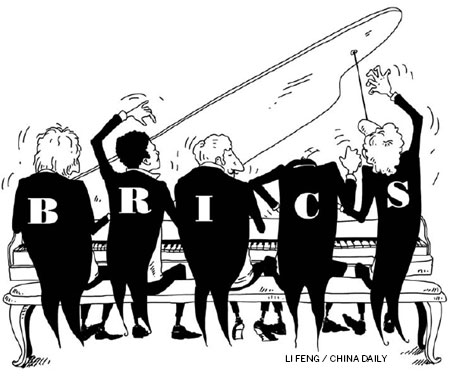BRICS out to build new order
Updated: 2013-03-25 08:00
By Wang Yusheng (China Daily)
|
||||||||

The fifth BRICS summit, to be held in Durban, South Africa, on March 26 and 27, is a meeting of five countries that represent the emerging developing world at a time when the international order is undergoing a change.
After a decade of joint efforts, the BRICS mechanism is making sustainable contributions to the world. From the first BRIC summit in Yekaterinburg, Russia, before South Africa became a member, through those held in Brazil, China and India, the group has focused on common interests while shelving differences over strategic plans, aims and obligations.
BRICS member states have different social systems and follow different ideologies. But because of their mutual trust and respect, and shared interests they hold similar views on how to address the pressing issues obstructing global development.
The five emerging economies, because of their huge potential and sustainability, have helped bring about quantitative changes across the world and played a pivotal role in the dialogue between G20 and G7.
The BRICS member states are striving to establish a peaceful international environment, and promote democracy and equality in international relations, as opposed to the Cold War mentality of confrontational policies. They advocate and respect the independence, sovereignty and territorial integrity of every country.
The five-member group hopes to build a fairer and more equitable global economic and financial order, which has been dominated by major developed countries, especially the United States owing to their hold over the International Monetary Fund and World Bank.
The BRICS group's shared strategic target is to build a more democratic, fairer, multipolar world, and ensure that the United Nations plays the central role in world affairs. China and Russia are permanent members of the UN Security Council. And if India, Brazil or South Africa succeeds in getting a permanent Security Council seat, it will further bolster BRICS' status and global influence.
Since BRICS member states are committed to strengthening partnerships for common development on the principle of inclusiveness, solidarity and mutual assistance, they will deepen cooperation with not only other developing countries, but also regional and international organizations.
As a coalition different from any other international organization, the group strives for further improvement in the world order on the basis of the Five Principles of Peaceful Coexistence and the "Bandung Spirit". The Durban summit will see this principle and spirit in full play when BRICS leaders move to the next stage of cooperation. Under the theme of "BRICS and Africa - Partnerships for Integration and Industrialization", the summit will create opportunities both for Africa and BRICS.
The trade volume between BRICS and African countries has doubled since 2007 and is projected to exceed $500 billion by 2015. The average GDP growth of African countries has been 5 percent over the past decade. And in 2011, six of the 10 countries with the highest GDP growth rates in the world were from Africa.
Emerging from colonization and marginalization, many African countries fell prey to the West's post-Cold War strategy of spreading "democracy" (and thus "prosperity"). Now they are shedding the cloak of false democracy and seeking a development road that suits their own national conditions.
BRICS member states are capable enough and determined to cooperate with African countries for mutual benefit, and their leaders will hold dialogues with their counterparts in African countries. President Xi Jinping is expected to play a major role in the decisions that are taken at these meetings and the contributions the group would make in the development of the continent.
Based on a proposal of BRICS leaders at the last summit in India, the Durban summit will discuss the creation of a "BRICS Development Bank", which is highly significant because such a bank will help the five countries capitalize on and increase each other's advantages.
A "BRICS Development Bank", if it becomes reality, will play a critical role in promoting the five countries' economic growth, and facilitating their trade and investments. Different from the IMF and World Bank, the BRICS bank would be customized to offer projects for developing countries in more favorable ways. Also, a BRICS bank would be an important move in the group's efforts to reshape international relations, because of its professed aim of seeking common interests among developing countries and working for the development of the entire world.
Although some people are trying to fuel dissension and disunity among BRICS member states, they will not succeed in derailing the sustainable development of the group. Differences and difficulties do exist, but they only conform to the trend of times. The need is to pay attention to common interests and forge ahead by jointly weathering the hardships.
The author is executive director of the Strategy Research Center of China International Studies Research Fund.
(China Daily 03/25/2013 page9)

 In Photos: 7.0-magnitude quake hits Sichuan
In Photos: 7.0-magnitude quake hits Sichuan
 Li Na on Time cover, makes influential 100 list
Li Na on Time cover, makes influential 100 list
 FBI releases photos of 2 Boston bombings suspects
FBI releases photos of 2 Boston bombings suspects
 World's wackiest hairstyles
World's wackiest hairstyles
 Sandstorms strike Northwest China
Sandstorms strike Northwest China
 Never-seen photos of Madonna on display
Never-seen photos of Madonna on display
 H7N9 outbreak linked to waterfowl migration
H7N9 outbreak linked to waterfowl migration
 Dozens feared dead in Texas plant blast
Dozens feared dead in Texas plant blast
Most Viewed
Editor's Picks

|

|

|

|

|

|
Today's Top News
Live report: 7.0-magnitude quake hits Sichuan, heavy casualties feared
Boston suspect cornered on boat
Cross-talk artist helps to spread the word
'Green' awareness levels drop in Beijing
Palace Museum spruces up
First couple on Time's list of most influential
H7N9 flu transmission studied
Trading channels 'need to broaden'
US Weekly

|

|







